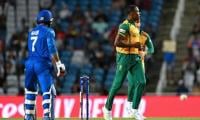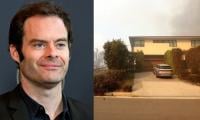ISLAMABAD: The Islamabad High Court (IHC) on Friday stopped the trial court from recording statements of witnesses in the case against Pakistan Tehreek-e-Insaf (PTI) founder Imran Khan and his wife Bushra Bibi for solemnizing the nikah in an un-Islamic way.
The directives were issued by IHC Chief Justice Aamer Farooq during the hearing of the case.
Imran, who was removed from prime minister’s office in April 2022, and his wife have denied all the charges in the case registered by Bushra’s former husband, Khawar Maneka, in November 2023.
At the hearing’s outset, Imran and Bushra’s counsel Barrister Salman Akram Raja apprised the court that the entire district judiciary was present in the Adiala Jail to record statements of witnesses. The IHC chief justice then directed him to provide details of the case as he would stop the trial court from recording the witnesses’ statements.
Even if the witnesses’ statements were accepted, the nikah took place 48 days after the divorce, Raja said.
The court inquired what was the duration of iddat (the intervening period before the next marriage). The barrister replied usually it was 90 days but Islamic jurisprudent and noted scholar Mufti Taqi Usmani had given a clarification for the said period. He also said a Supreme Court verdict was available regarding iddat.
CJ Farooq said let’s suppose the SC ruling was not available, then what was he challenging in the petition. The counsel replied he had challenged the summon issued to Imran and Bushra in the case.
The chief justice said as per the law, if nikah was solemnised during iddat, then it was regularised later. He wondered what the crime was even if the nikah was not formal. The high court issued a notice to Bushra’s ex-husband, Khawar Maneka, and adjourned the case till January 25.
On January 15, a local court had indicted Imran and his wife in the case of solemnising their marriage against Islamic laws.
Senior Civil Judge Qudratullah had read out the charges in the court set up in Rawalpindi’s Adiala Jail.
Separately, Senior Civil Judge Qudratullah adjourned hearing of Imran-Bushra nikah case on the IHC orders. Imran’s lawyer Salman Akram Raja and complainant’s lawyer Raja Rizwan Abbasi appeared before the court. Raja informed the court about the injunction order of the IHC, submitted a brief judgment, and the court adjourned the hearing till January 29.
Khawar Maneka, the ex-husband of Bushra Bibi, and Mufti Saeed, were present in the court to record their statement.
Separately, the PTI founder Imran Khan and his wife Bushra Bibi could not be indicted in the £190 million reference due to change of lawyers on Friday.
Accountability Court Judge Muhammad Bashir was hearing the case in Adiala Jail, Rawalpindi. Imran Khan and Bushra Bibi appeared in the court. Their lawyers -- Latif Khosa, Shahbaz Khosa, Usman Gul, and Salman Akram Raja, as well as Amjad Parvez, Deputy Prosecutor General NAB Sardar Muzaffar Abbasi, Irfan Bhola and Sohail Arif appeared in the court.
The PTI founder filed a request for change of lawyers in the reference. The new team of lawyers includes Barrister Ali Zafar, Sikandar Zulqarnain and Usman Gul.
Usman Gul Advocate said Imran Khan’s lawyer Ali Zafar was not present in the court and therefore charges could not be filed.
The PTI founder also came to the rostrum and said that only a lawyer could explain the legal terms, written in the charge sheet. In the absence of a lawyer, the charge was not acceptable to him. This is also a lie and all this is being done by the space creature ‘Colonel Sahib’ who’s overseeing it, the PTI founder said. He also waved his hand in front of the CCTV camera, installed in the courtroom and said in a loud voice, ‘Colonel! Imran is speaking’.
At this there was a laughter in the courtroom. The court postponed the indictment proceedings till January 24.
Also, in the Toshakhana reference against Imran and Bushra, which is being heard by Accountability Court Judge Muhammad Bashir, the statement of Assistant Commissioner Secretariat, Islamabad, was recorded on Friday.
Imran and Bushra appeared in the court, wherein his lawyers Latif Khosa, Shehbaz Khosa and Usman Gill were also present. Lawyer Amjad Parvez on behalf of NAB, Deputy Prosecutor General NAB Sardar Muzaffar Abbasi, Irfan Bhola and others also appeared in the court. The hearing was adjourned till Saturday (today) for recording more witnesses.
Meanwhile, the federal government Friday challenged in the Supreme Court of Pakistan the IHC verdict declaring its notification pertaining to Imran Khan’s jail trial in the cipher case unlawful.
The Federation through the secretaries, Ministry of Law and Justice and Ministry of Interior, filed a petition with the apex court under Article 185(3) of the Constitution, seeking leave to appeal against the judgment dated November 21, 2023, passed by the Islamabad High Court. It has made Imran Khan, director general FIA, chief commissioner Islamabad, IGP Islamabad, district magistrate/deputy commissioner Islamabad, special judge Anti-Terrorism Court, superintendent Adiala Jail Rawalpindi and superintendent District Jail Attock respondents. The government has questioned whether the impugned judgment passed by the IHC Divisional Bench is in consonance with the law laid down on the subject and whether an intra-court appeal is competent in the light of facts and circumstances of the case? Whether the order within the meaning of Section 352 CrPC could be challenged in the revision jurisdiction? Whether, on the other hand, the notification issued by the petitioner for the jail trial is covered within the definition of proceedings?
The government has further questioned whether it is a settled law that the government is competent to issue notifications with retrospective effect unless and until it is not injurious to vested right of an individual? It has prayed to the apex court that leave to appeal may please be granted from the impugned IHC judgment in the interest of justice. It has submitted that the IHC erred in discussing grounds of revision.
“Section 14 of the Official Secrets Act is something different from other laws and talks about secrecy of proceedings,” the government has contended, adding that the principle of open trial has not been rightly applied to cases pertaining to the Official Secrets Act and the intention of the legislature in introducing Section 14 of OSA was to protect state secrets.
Chairman Senator Farooq Hamid Naek presided over committee at Parliament House on Wednesday
Spox says govt has played a mediatory role in this agreement, and process of disarmament is in progress
UN's role is to support govts and societies but world has become very complex and there is no easy solution, says Afke...
Meeting highlights ongoing efforts to enhance diplomatic relations between Pakistan and UAE
Minister says task force is finalising recommendations, report will be submitted to PM in next two weeks
Sindh CM and governor accompanied prime minister to residence of Sharjeel Memon







